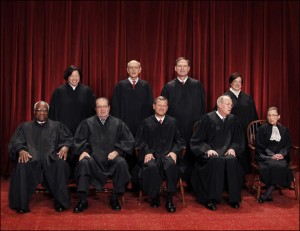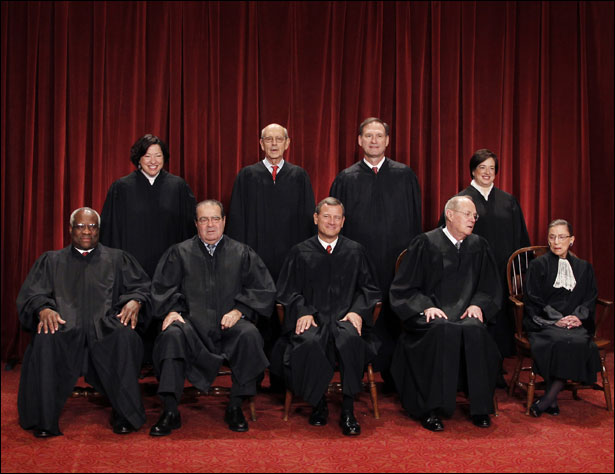High court clears up Confrontation Clause conflict
The Wisconsin Supreme Court has ruled that certain toxicology reports may be admitted at trial without testimony from or cross-examination of the authors of those reports without violating the Sixth Amendment’s confrontation clause.
Attorneys must be given resources to defend criminals
“The right of one charged with crime to counsel may not be deemed fundamental and essential to fair trials in some countries, but it is in ours,” announced the U.S. Supreme Court in 1963 in first determining that the Sixth and Fourteenth Amendments to the U.S. Constitution requires states to provide lawyers to the indigent accused facing a potential loss of liberty in a felony case.
Judge vacates man’s conviction in wife’s poisoning (UPDATE)
A Wisconsin man convicted of poisoning his wife 15 years ago was improperly tried because he couldn't confront his dead wife and her "letter from the grave" implicating the husband as the primary suspect, a federal judge has ruled.
US Supreme Court to consider fight over frozen assets
When Kerri and Brian Kaley came under federal investigation for allegedly stealing medical devices, they took out a $500,000 line of credit on their New York house to hire lawyers. Yet after their indictment in 2007, prosecutors sought to prevent the Kaleys from using the money because the government intended to seize the house.
US Supreme Court dismisses ineffective counsel case
After taking up and hearing arguments in a case considering whether a delay caused by a state’s failure to fund counsel for an indigent’s defense should be a factor in determining whether the defendant’s Sixth Amendment right to a speedy trial was violated, the U.S. Supreme Court dismissed the case as improvidently granted.
Progress, room for improvement 50 years after Gideon decision
Fifty years ago today, U.S. Supreme Court Justice Hugo Black delivered the unanimous, nine-page majority opinion in Gideon v. Wainwright.
Justices of US Supreme Court provide clarity — but no relief — for immigration defendants
 A decision from the U.S. Supreme Court that a seminal Sixth Amendment rights case is not retroactive has provided clarity for attorneys while dashing the hopes of thousands of defendants.
A decision from the U.S. Supreme Court that a seminal Sixth Amendment rights case is not retroactive has provided clarity for attorneys while dashing the hopes of thousands of defendants.
Four-time OWI offender collaterally attacks prior attorney waivers
A four-time OWI defendant will get another chance to prove he did not knowingly waive his right to legal counsel in two earlier OWI cases, according to a recently issued Wisconsin appellate court opinion.
US Supreme Court takes up sentencing factors case
In a case that raises the question of whether judges, rather than juries, can constitutionally decide factors that could trigger an increase in the minimum sentence, the justices of the U.S. Supreme Court seemed reluctant to shake up a sentencing scheme that Congress and the courts have relied upon for more than a decade.
US Supreme Court: Criminal fines must be decided by a jury
Like other factors that increase a criminal defendant’s sentence, facts that determine the amount of criminal fines imposed on a defendant must be decided beyond a reasonable doubt by a jury, the U.S. Supreme Court ruled at the end of the term in a 6-3 decision.
Lawyers await Padilla retroactivity ruling
Two years after the U.S. Supreme Court’s landmark ruling that the Sixth Amendment requires criminal defense attorneys to warn noncitizen clients if a guilty plea carries a risk of deportation, the justices are poised to decide just how far back that constitutional protection extends.
High court: Counsel right extended to expired plea deals
A criminal defendant could assert an ineffective assistance of counsel claim with respect to plea deals that his lawyer failed to communicate to him before they expired, the U.S. Supreme Court has ruled 5-4.
Legal News
- Former law enforcement praise state’s response brief in Steven Avery case
- Eric Toney announces re-election bid for Fond du Lac County District Attorney
- Former Wisconsin Democratic Rep. Peter Barca announces new bid for Congress
- Republicans file lawsuit challenging Evers’s partial vetoes to literacy bill
- More human remains believed those of missing woman wash up on Milwaukee Co. beach
- Vice President Harris returning to Wisconsin for third visit this year
- Wisconsin joins Feds, dozens of states to hold airlines accountable for bad behavior
- Trump ahead of Biden in new Marquette poll
- Bankruptcy court approves Milwaukee Marriott Downtown ‘business as usual’ motion
- New Crime Gun Intelligence Center to launch in Chicago
- Arrest warrant proposed for Minocqua Brewing owner who filed Lawsuit against Town of Minocqua
- Wisconsin Supreme Court justices question how much power Legislature should have
WLJ People
- Power 30 Personal Injury Attorneys – Russell Nicolet
- Power 30 Personal Injury Attorneys – Benjamin Nicolet
- Power 30 Personal Injury Attorneys – Dustin T. Woehl
- Power 30 Personal Injury Attorneys – Katherine Metzger
- Power 30 Personal Injury Attorneys – Joseph Ryan
- Power 30 Personal Injury Attorneys – James M. Ryan
- Power 30 Personal Injury Attorneys – Dana Wachs
- Power 30 Personal Injury Attorneys – Mark L. Thomsen
- Power 30 Personal Injury Attorneys – Matthew Lein
- Power 30 Personal Injury Attorneys – Jeffrey A. Pitman
- Power 30 Personal Injury Attorneys – William Pemberton
- Power 30 Personal Injury Attorneys – Howard S. Sicula


